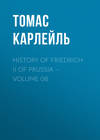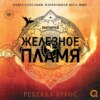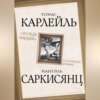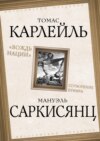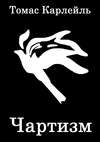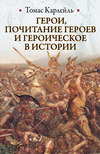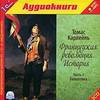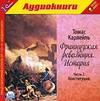Loe raamatut: «History of Friedrich II of Prussia — Volume 08»
BOOK VIII. — CROWN-PRINCE REPRIEVED: LIFE AT CUSTRIN — November, 1730-February, 1732
Chapter I. — CHAPLAIN MULLER WAITS ON THE CROWN-PRINCE
Friedrich's feelings at this juncture are not made known to us by himself in the least; or credibly by others in any considerable degree. As indeed in these confused Prussian History-Books, copulent in nugatory pedantisms and learned marine-stores, all that is human remains distressingly obscure to us; so seldom, and then only as through endless clouds of ever-whirling idle dust, can we catch the smallest direct feature of the young man, and of his real demeanor or meaning, on the present or other occasions! But it is evident this last phenomenon fell upon him like an overwhelming cataract; crushed him down under the immensity of sorrow, confusion and despair; his own death not a theory now, but probably a near fact,—a welcome one in wild moments, and then anon so unwelcome. Frustrate, bankrupt, chargeable with a friend's lost life, sure enough he, for one, is: what is to become of him? Whither is he to turn, thoroughly beaten, foiled in all his enterprises? Proud young soul as he was: the ruling Powers, be they just, be they unjust, have proved too hard for him! We hear of tragic vestiges still traceable of Friedrich, belonging to this time: texts of Scripture quoted by him, pencil-sketches of his drawing; expressive of a mind dwelling in Golgothas, and pathetically, not defiantly, contemplating the very worst.
Chaplain Muller of the Gens-d'Armes, being found a pious and intelligent man, has his orders not to return at once from Custrin; but to stay there, and deal with the Prince, on that horrible Predestination topic and his other unexampled backslidings which have ended so. Muller stayed accordingly, for a couple of weeks, intensely busy on the Predestination topic, and generally in assuaging, and mutually mollifying, paternal Majesty and afflicted Son. In all which he had good success; and especially on the Predestination point was triumphantly successful. Muller left a little Book in record of his procedures there; which, had it not been bound over to the official tone, might have told us something. His Correspondence with the King, during those two weeks, has likewise been mostly printed; [Forster, i. 376-379.] and is of course still more official,—teaching us next to nothing, except poor Friedrich Wilhelm's profoundly devotional mood, anxieties about "the claws of Satan" and the like, which we were glad to hear of above. In Muller otherwise is small help for us.
But, fifty years afterwards, there was alive a Son of this Muller's; an innocent Country Parson, not wanting in sense, and with much simplicity and veracity; who was fished out by Nicolai, and set to recalling what his Father used to say of this adventure, much the grandest of his life. In Muller Junior's Letter of Reminiscences to Nicolai we find some details, got from his Father, which are worth gleaning:—
"When my Father first attempted, by royal order, to bring the Crown-Prince to acknowledgment and repentance of the fault committed, Crown-Prince gave this excuse or explanation: 'As his Father could not endure the sight of him, he had meant to get out of the way of his displeasure, and go to a Court with which his Father was in friendship and relationship,'"—clearly indicating England, think the Mullers Junior and Senior.
"For proof that the intention was towards England this other circumstance serves, that the one confidant—Herr van Keith, if I mistake not [no, you don't mistake], had already bespoken a ship for passage out."—Here is something still more unexpected:—
"My Father used to say, he found an excellent knowledge and conviction of the truths of religion in the Crown-Prince. By the Prince's arrangement, my Father, who at first lodged with the Commandant, had to take up his quarters in the room right above the Prince; who daily, often as early as six in the morning, rapped on the ceiling for him to come down; and then they would dispute and discuss, sometimes half-days long, about the different tenets of the Christian Sects;—and my Father said, the Prince was perfectly at home in the Polemic Doctrines of the Reformed (Calvinistic) Church, even to the minutest points. As my Father brought him proofs from Scripture, the Prince asked him one time, How he could keep chapter and verse so exactly in his memory? Father drew from his pocket a little Hand-Concordance, and showed it him as one help. This he had to leave with the Prince for some days. On getting it back, he found inside on the fly-leaf, sketched in pencil,"—what is rather notable to History,—"the figure of a man on his knees, with two swords hanging crosswise over his head; and at the bottom these words of Psalm Seventy-third (verses 25, 26), Whom have I in Heaven but thee? And there is none upon earth that I desire besides thee. My flesh and my heart fainteth and faileth; but God is the strength of my heart, and my portion forever."—Poor Friedrich, this is a very unexpected pen-sketch on his part; but an undeniable one; betokening abstruse night-thoughts and forebodings in the present juncture!—
"Whoever considers this fine knowledge of religion, and reflects on the peculiar character and genius of the young Herr, which was ever struggling towards light and clearness (for at that time he had not become indifferent to religion, he often prayed with my Father on his knees),—will find that it was morally impossible this young Prince could have thought [as some foolish persons have asserted] of throwing himself into the arms of Papal Superstition [seeking help at Vienna, marrying an Austrian Archduchess, and I know not what] or allow the intrigues of Catholic Priests to"—Oh no, Herr Muller, nobody but very foolish persons could imagine such a thing of this young Herr.
"When my Father, Herr von Katte's execution being ended, hastened to the Crown-Prince; he finds him miserably ill (SEHR ALTERIRT); advises him to take a cooling-powder in water, both which materials were ready on the table. This he presses on him: but the Prince always shakes his head." Suspects poison, you think? "Hereupon my Father takes from his pocket a paper, in which he carried cooling-powder for his own use; shakes out a portion of it into his hand, and so into his mouth; and now the Crown-Prince grips at my Father's powder, and takes that." Privately to be made away with; death resolved upon in some way! thinks the desperate young man? [Nicolai, Anekdoten, vi. 183-189.]
That scene of Katte's execution, and of the Prince's and other people's position in regard to it, has never yet been humanly set forth, otherwise the response had been different. Not humanly set forth,—and so was only barked at, as by the infinitude of little dogs, in all countries; and could never yet be responded to in austere VOX HUMANA, deep as a DE PROFUNDIS, terrible as a Chorus of AEschylus,—for in effect that is rather the character of it, had the barking once pleased to cease. "King of Prussia cannot sleep," writes Dickens: "the officers sit up with him every night, and in his slumbers he raves and talks of spirits and apparitions." [Despatch, 3d October, 1730.] We saw him, ghost-like, in the night-time, gliding about, seeking shelter with Feekin against ghosts; Ginkel by daylight saw him, now clad in thunderous tornado, and anon in sorrowful fog. Here, farther on, is a new item,—and joined to it and the others, a remarkable old one:—
"In regard to Wilhelmina's marriage, and whether a Father cannot give his daughter in wedlock to whom he pleases, there have been eight Divines consulted, four Lutheran, four Reformed (Calvinist); who, all but one [he of the Garrison Church, a rhadamanthine fellow in serge], have answered, 'No, your Majesty!' It is remarkable that his Majesty has not gone to bed sober for this month past." [Dickens, 9th and 19th December, 1730.]
What Seckendorf and Grumkow thought of all these phenomena? They have done their job too well. They are all for mercy; lean with their whole weight that way,—in black qualms, one of them withal, thinking tremulously to himself, "What if his now Majesty were to die upon us, in the interim!"
Chapter II. — CROWN-PRINCE TO REPENT AND NOT PERISH
In regard to Friedrich, the Court-Martial needs no amendment from the King; the sentence on Friedrich, a Lieutenant-Colonel guilty of desertion, is, from President and all members except two, Death as by law. The two who dissented, invoking royal clemency and pardon, were Major-Generals by rank,—Schwerin, as some write, one of them, or if not Schwerin, then Linger; and for certain, Donhof,—two worthy gentlemen not known to any of my readers, nor to me, except as names, The rest are all coldly of opinion that the military code says Death. Other codes and considerations may say this and that, which it is not in their province to touch upon; this is what the military code says: and they leave it there.
The Junius Brutus of a Royal Majesty had answered in his own heart grimly, Well then! But his Councillors, Old Dessauer, Grumkow, Seckendorf, one and all interpose vehemently. "Prince of the Empire, your Majesty, not a Lieutenant-Colonel only! Must not, cannot;"—nay good old Buddenbrock, in the fire of still unsuccessful pleading, tore open his waistcoat: "If your Majesty requires blood, take mine; that other you shall never get, so long as I can speak!" Foreign Courts interpose; Sweden, the Dutch; the English in a circuitous way, round by Vienna to wit; finally the Kaiser himself sends an Autograph; [Date, 11th October, 1730 (Forster, i. 380).] for poor Queen Sophie has applied even to Seckendorf, will be friends with Grumkow himself, and in her despair is knocking at every door. Junius Brutus is said to have had paternal affections withal. Friedrich Wilhelm, alone against the whispers of his own heart and the voices of all men, yields at last in this cause. To Seckendorf, who has chalked out a milder didactic plan of treatment, still rigorous enough, [His Letter to the King, 1st November, 1730 (in Forster, i. 375, 376).] he at last admits that such plan is perhaps good; that the Kaiser's Letter has turned the scale with him; and the didactic method, not the beheading one, shall be tried. That Donhof and Schwerin, with their talk of mercy, with "their eyes upon the Rising Sun," as is evident, have done themselves no good, and shall perhaps find it so one day. But that, at any rate, Friedrich's life is spared; Katte's execution shall suffice in that kind. Repentance, prostrate submission and amendment,—these may do yet more for the prodigal, if he will in heart return. These points, some time before the 8th of November, we find to be as good as settled.
The unhappy prodigal is in no condition to resist farther. Chaplain Muller had introduced himself with Katte's dying admonition to the Crown-Prince to repent and submit. Chaplain Muller, with his wholesome cooling-powders, with his ghostly counsels, and considerations of temporal and eternal nature,—we saw how he prospered almost beyond hope. Even on Predestination, and the real nature of Election by Free Grace, all is coming right, or come, reports Muller. The Chaplain's Reports, Friedrich Wilhelm's grimly mollified Responses on the same: they are written, and in confused form have been printed; but shall be spared the English reader. And Grumkow has been out at Custrin, preaching to the same purport from other texts: Grumkow, with the thought ever present to him, "What if Friedrich Wilhelm should die?" is naturally an eloquent preacher. Enough, it has been settled (perhaps before the day of Katte's death, or at the latest three days after it, as we can see), That if the Prince will, and can with free conscience, take an Oath ("no mental reservation," mark you!) of contrite repentance, of perfect prostrate submission, and purpose of future entire obedience and conformity to the paternal mind in all things, "GNADENWAHL" included,—the paternal mind may possibly relax his durance a little, and put him gradually on proof again. [King's Letter to Muller, 8th November (Forster, i. 379).]
Towards which issue, as Chaplain Muller reports, the Crown-Prince is visibly gravitating, with all his weight and will. The very GNADENWAHL is settled; the young soul (truly a lover of Truth, your Majesty) taps on his ceiling, my floor being overhead, before the winter sun rises, as a signal that I must come down to him; so eager to have error and darkness purged away. Believes himself, as I believe him, ready to undertake that Oath; desires, however, to see it first, that he may maturely study every clause of it.—Say you verily so? answers Majesty. And MAY my ursine heart flow out again, and blubber gratefully over a sinner saved, a poor Son plucked as brand from the burning?"God, the Most High, give His blessing on it, then!" concludes the paternal Majesty: "And as He often, by wondrous guidances, strange paths and thorny steps, will bring men into the Kingdom of Christ, so may our Divine Redeemer help that this prodigal son be brought into His communion. That his godless heart be beaten till it is softened and changed; and so he be snatched from the claws of Satan. This grant us the Almighty God and Father, for our Lord Jesus Christ and His passion and death's sake! Amen!—I am, for the rest, your well-affectioned King, FRIEDRICH WILHELM (WUSTERHAUSEN, 8th NOVEMBER, 1730)." [Forster, i. 379.]
CROWN-PRINCE BEGINS A NEW COURSE
It was Monday, 6th November, when poor Katte died. Within a fortnight, on the second Sunday after, there has a Select Commission, Grumkow, Borck, Buddenbrock, with three other Soldiers, and the Privy Councillor Thulmeyer, come out to Custrin: there and then, Sunday, November 19th, [Nicolai, exactest of men, only that Documents were occasionally less accessible in his time, gives (ANEKDOTEN, vi. 187), "Saturday, November 25th," as the day of the Oath; but, no doubt, the later inquirers, Preuss (i. 56) and others, have found him wrong in this small instance.] these Seven, with due solemnity, administer the Oath (terms of Oath conceivable by readers); Friedrich being found ready. He signs the Oath, as well as audibly swears it: whereupon his sword is restored to him, and his prison-door opened. He steps forth to the Town Church with his Commissioners; takes the sacrament; listens, with all Custrin, to an illusive Sermon on the subject; "text happily chosen, preacher handling it well." Text was Psalm Seventy-seventh, verse eleventh (tenth of our English version), And I said, This is my infirmity; but I will remember the years of the right hand of the Host High; or, as Luther's version more intelligibly gives it, This I have to suffer; the right hand of the Most High can change all. Preacher (not Muller but another) rose gradually into didactic pathos; Prince, and all Custrin, were weeping, or near weeping, at the close of the business. [Preuss, i. 56.]
Straight from Church the Prince is conducted, not to the Fortress, but to a certain Town Mansion, which he is to call his own henceforth, under conditions: an erring Prince half liberated, and mercifully put on proof again. His first act here is to write, of his own composition, or helped by some official hand, this Letter to his All-serenest Papa; which must be introduced, though, except to readers of German who know the "DERE" (TheirO), "ALLERDURCHLAUCHTIGSTER," and strange pipe-clay solemnity of the Court-style, it is like to be in great part lost in any translation:—
"CUSTRIN, 19th November, 1730.
"ALL-SERENEST AND ALL-GRACIOUSEST FATHER,—To your Royal Majesty, my All-graciousest Father, have,"—I.E. "I have," if one durst write the "I,"—"by my disobedience as TheirO [YourO] subject and soldier, not less than by my undutifulness as TheirO Son, given occasion to a just wrath and aversion against me. With the All-obedientest respect I submit myself wholly to the grace of my most All-gracious Father; and beg him, Most All-graciously to pardon me; as it is not so much the withdrawal of my liberty in a sad arrest (MALHEUREUSEN ARREST), as my own thoughts of the fault I have committed, that have brought me to reason: Who, with all-obedientest respect and submission, continue till my end,
"My All-graciousest King's and Father's faithfully obedientest Servant and Son,
"FRIEDRICH."
[Preuss, i. 56, 57; and Anonymous, Friedrichs des Grossen Briefe an seinen Vater (Berlin, Posen und Bromberg, 1838), p. 3.]
This new House of Friedrich's in the little Town of Custrin, he finds arranged for him on rigorously thrifty principles, yet as a real Household of his own; and even in the form of a Court, with Hofmarschall, Kammerjunkers, and the other adjuncts;—Court reduced to its simplest expression, as the French say, and probably the cheapest that was ever set up. Hafmarschall (Court-marshal) is one Wolden, a civilian Official here. The Kammerjunkers are Rohwedel and Natzmer; Matzmer Junior, son of a distinguished Feldmarschall: "a good-hearted but foolish forward young fellow," says Wilhelmina; "the failure of a coxcomb (PETIT-MAITRE MANQUE)." For example, once, strolling about in a solemn Kaiser's Soiree in Vienna, he found in some quiet corner the young Duke of Lorraine, Franz, who it is thought will be the divine Maria Theresa's husband, and Kaiser himself one day. Foolish Natzmer found this noble young gentleman in a remote corner of the Soiree; went up, nothing loath, to speak graciosities and insipidities to him: the noble young gentleman yawned, as was too natural, a wide long yawn; and in an insipid familiar manner, foolish Natzmer (Wilhelmina and the Berlin circles know it) put his finger into the noble young gentleman's mouth, and insipidly wagged it there. "Sir, you seem to forget where you are!" said the noble young gentleman; and closing his mouth with emphasis, turned away; but happily took no farther notice. [Wilhelmina, i. 310.] This is all we yet know of the history of Natzmer, whose heedless ways and slap-dash speculations, tinted with natural ingenuity and good-humor, are not unattractive to the Prince.
Hofmarschall and these two Kammerjunkers are of the lawyer species; men intended for Official business, in which the Prince himself is now to be occupied. The Prince has four lackeys, two pages, one valet. He wears his sword, but has no sword-tash (PORTE EPEE), much less an officer's uniform: a mere Prince put upon his good behavior again; not yet a soldier of the Prussian Army, only hoping to become so again. He wears a light-gray dress, "HECHTGRAUER (pike-gray) frock with narrow silver cordings;" and must recover his uniform, by proving himself gradually a new man.
For there is, along with the new household, a new employment laid out for him in Custrin; and it shall be seen what figure he makes in that, first of all. He is to sit in the DOMANEN-KAMMER or Government Board here, as youngest Rath; no other career permitted. Let him learn Economics and the way of managing Domain Lands (a very principal item of the royal revenues in this Country): humble work, but useful; which he had better see well how he will do. Two elder Raths are appointed to instruct him in the Economic Sciences and Practices, if he show faculty and diligence;—which in fact he turns out to do, in a superior degree, having every motive to try.
This kind of life lasted with him for the next fifteen months, all through the year 1731 and farther; and must have been a very singular, and was probably a highly instructive year to him, not in the Domain Sciences alone. He is left wholly to himself. All his fellow-creatures, as it were, are watching him. Hundred-eyed Argus, or the Ear of Dionysius, that is to say, Tobacco-Parliament with its spies and reporters,—no stirring of his finger can escape it here. He has much suspicion to encounter: Papa looking always sadly askance, sadly incredulous, upon him. He is in correspondence with Grumkow; takes much advice from Grumkow (our prompter-general, president in the Dionysius'-Ear, and not an ill-wisher farther); professes much thankfulness to Grumkow, now and henceforth. Thank you for flinging me out of the six-story window, and catching me by the coat-skirts!—Left altogether to himself, as we said; has in the whole Universe nothing that will save him but his own good sense, his own power of discovering what is what, and of doing what will be behooveful therein.
He is to quit his French literatures and pernicious practices, one and all. His very flute, most innocent "Princess," as he used to call his flute in old days, is denied him ever since he came to Custrin;—but by degrees he privately gets her back, and consorts much with her; wails forth, in beautiful adagios, emotions for which there is no other utterance at present. He has liberty of Custrin and the neighborhood; out of Custrin he is not to lodge, any night, without leave had of the Commandant. Let him walk warily; and in good earnest study to become a new creature, useful for something in the Domain Sciences and otherwise.
